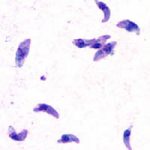Originally posted May 1, 2009
One of the most interesting parasites is the protozoan Toxoplasma gondii. This sucker is everywhere and capable of some pretty amazing behavioral host manipulations.
Nearly all warm-blooded organisms can be an intermediate host for this parasite. The parasite reproduces asexually in this host and forms cysts in its muscles and brain tissues. The parasite “wants” (in an evolutionary sense) its intermediate host to be consumed by its definitive host (wild and domestic cats) and has evolved elaborate mechanisms for altering its host’s behavior to make this happen. For example, infected mice become more active and more willing to spend time in open areas.
Studies in rats have produced even more surprising results. Rats have an innate aversion to cat urine because it is usually a very good indicator that a predator is in the area. A study comparing rats infected with Toxoplasma gondii to uninfected controls discovered that not only do infected individuals lack the characteristic aversion response, but they actually seem to be drawn TO cat urine, a behavior which is certainly risky for a rodent.
So parasites seem pretty capable of modifying the behaviors of rodents. But what about people?
For many years, infection by Toxoplasma gondii in people wasn’t thought to be serious. Infected individuals would exhibit flu-like systems for a few days to a month or so, but after that would no longer feel “sick.” However, we now know that individuals remain infected because the parasite forms antibiotic resistant cysts that continue to reside in muscle and brain tissues.
Recently, some labs have begun looking at whether or not Toxoplasma gondii has subtle behavioral effects that may have been overlooked in the past. Research is accumulating to suggest that this is indeed the case.
Personality surveys have yielded mixed results, but the majority of surveys reveal that Toxoplasma gondii infected individuals exhibit significantly different behaviors than uninfected controls. For example, personality inventory results suggested thatinfected males are more vigilant, frugal, suspicious, jealous and less rule-following than male uninfected controls (any other women finding themselves wondering if particular ex-boyfriends were carrying heavy parasite loads??). Infected women, on the other hand, show a higher “superego strength,” meaning that they’re more moral, warm, persistent, rule-conscious and outgoing. These behavioral differences are more noticeable as time goes on.
But that’s not all! Both infected men and women show higher apprehension, greater insecurity, and a decrease in novelty-seeking behaviors. Importantly, infected individuals appear to have slower reaction times than uninfected individuals. If you’re wondering whether or not the difference in reaction times is enough to matter, then consider the finding that infected individuals are 2.65 times more likely to be in a traffic accident than an uninfected individual.
Finally, and perhaps most perplexing, is the finding that infected females are pregnant for a longer and are more likely to give birth to a son than a daughter.
An important disclaimer should be made here. Because purposefully infecting people would be unethical, we can’t scientifically compare human behaviors before and after infection with Toxoplasma gondii. This means that it’s currently impossible to figure out whether this parasite induces the behavioral changes or whether individuals with a certain personality type are simply more likely to become infected.
The jury is still out on the mechanism the parasite uses to induce these manipulations. Promising research suggests that manipulation of the dopaminergic system is to blame, but I’m not yet aware of anything conclusive.
So how do people become infected in the first place? One common way t o come in contact with the parasite is through the consumption of uncooked meats. Lots of warm-blooded animals contain infective Toxoplasma gondii cysts in their muscles, so countries in which people often enjoy undercooked meats have a higher occurrence of infection.
o come in contact with the parasite is through the consumption of uncooked meats. Lots of warm-blooded animals contain infective Toxoplasma gondii cysts in their muscles, so countries in which people often enjoy undercooked meats have a higher occurrence of infection.
Additionally, having cats around can increase infection risks. Toxoplasma gondii offspring are passed into the environment with a cat’s feces, where they become infective a few days later. Consuming the parasite and becoming infected can occur after changing a litter box or gardening (if cats have been defecating in the garden), for example.
Infection rates in a population depend on diet and feline exposure, and infection rates have been reported to be as high as 80% in some areas. In the United Kingdom, for example, a report revealed that up to 38% of stored meat samples contained Toxoplasma gondii.
These results have interesting implications! First of all, it’s almost scary to ponder whether or not some of the behavioral attributes that you consider to be quintessentially “you” are subtly modified by parasites. Second, how much of the differences between cultures can be explained by differences in infection rates? Might it be more dangerous to drive in countries where people eat a lot of uncooked meat, for example? Also, can information about how parasite behavioral manipulations tell us about how our brain works? Hopefully, the future holds more answers!
Read more(!):
Lots of work on this topic have been done by the Flegr lab and a review of their work on how Toxoplasma gondii effects human behavior can be found here.
A review of the rodent literature by Joanne Webster can be found here.
A paper on how Toxoplasma gondii may affect human culture by Kevin Lafferty can be found here.


[…] is Toxoplasma gondii‘s behavioral effects on humans (see a previous post on this protozoan here), parasitic fungi that behaviorally manipulate ants also geek me […]
This is crazy.. I am guessing I would look like a total lunatic if I went to my Doctor and asked him to find out if I had this, but it is all I can think about now. Is there any way to get rid of it or the people just stuck with this?
You can get a blood test to determine if you have it or not and, if you do, you can’t really do anything about it. You’re stuck with it.
I saw that you listen to This American Life. Do you also listen to Radiolab? They have an great podcast on parasites, and about 15 minutes devoted to Toxoplasma gondii. http://www.radiolab.org/ Check it out!
I have listened to that podcast. Thanks! 🙂
I was told by an optician that I had a toxoplasmosis scar on the back of my eye.
So apparently you can find out you have it without even asking.
[…] damage, which can result in death. The sea otters are also being parasitized by our old friend Toxoplasma gondii, which apparently makes it into the marine habitat when cat feces end up in water sources which […]
Wait, is the blood test thing permanent or only for the acute infection phase?
I think it’s awesome you started blogging more. Parasites, especially those that change your behaviour, are darned interesting! If you’re very interested in this sort of thing you could read up on psychopathy (as defined by Cleckley/Hare). Granted, they’re not very endoparasitic and not even of a different species than their hosts, but.. Well, y’know.
Here, here. To be honest, any sort of research is interesting, and it’s great to hear it from someone with a healthy level of skepticism for conclusions. Most of what you hear publicly involves conclusions (THIS is what this research means), so I appreciate hearing the simple facts and possible ideas. Plus, I like her sense of humor. Here’s to the Weiners!
Best thing about this is the logical conclusion I can make from it:
Facts:
* I am a guy
* Toxoplasma gondii come from cat feces
* Toxoplasma gondii causes men to be more ornery and suspicious
Conclusion: Don’t eat cat shit, or you become a douche.
I remember discussing this in an Anthropology course. I really enjoyed reading your article.
That’s strange, just tried quoting part of the blog post and it shows my own comment in italics. Embarrassing.